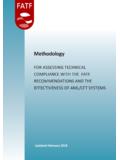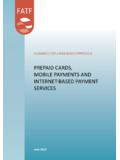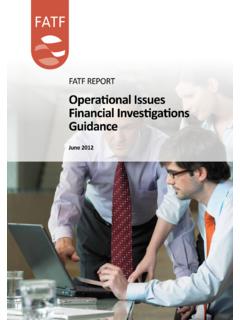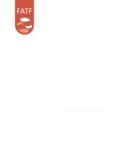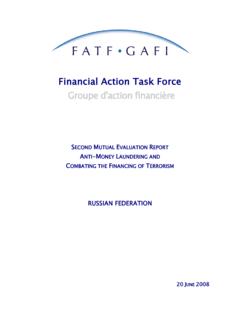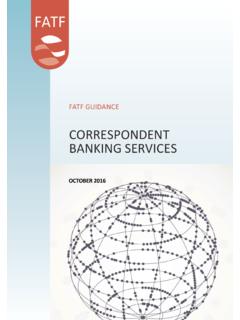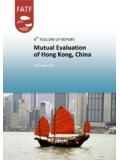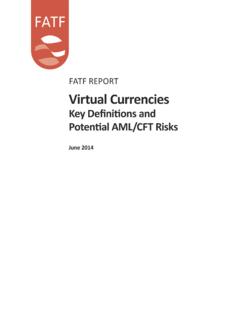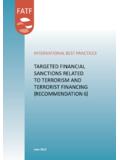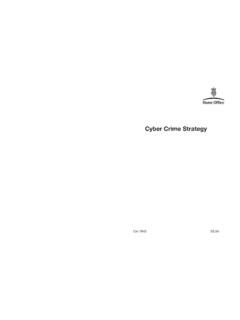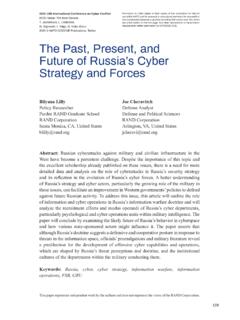Transcription of COVID-19-related Money Laundering and Terrorist Financing
1 COVID-19-related Money Laundering and Terrorist Financing Risks and Policy ResponsesMay 2020 The Financial Action Task Force (FATF) is an independent inter-governmental body that develops and promotes policies to protect the global financial system against Money Laundering , Terrorist Financing and the Financing of proliferation of weapons of mass destruction. The FATF Recommendations are recognised as the global anti- Money Laundering (AML) and counter- Terrorist Financing (CFT) standard. For more information about the FATF, please visit This document and/or any map included herein are without prejudice to the status of or sovereignty over any territory, to the delimitation of international frontiers and boundaries and to the name of any territory, city or area.
2 Citing reference: FATF (2020), COVID-19-related Money Laundering and Terrorist Financing Risks and Policy Responses, FATF, Paris, France, 2020 FATF/OECD. All rights reserved. No reproduction or translation of this publication may be made without prior written permission. Applications for such permission, for all or part of this publication, should be made to the FATF Secretariat, 2 rue Andr Pascal 75775 Paris Cedex 16, France (fax: +33 1 44 30 61 37 or e-mail: Photocredits coverphoto Gettyimages COVID-19-related Money Laundering and Terrorist Financing Risks and Policy Responses 2 | COVID-19-related ML/TF RISKS AND POTENTIAL POLICY RESPONSES | FATF Foreword The COVID-19 pandemic has led to unprecedented global challenges, human suffering and economic disruption.)
3 This paper identifies challenges, good practices and policy responses to new Money Laundering and Terrorist Financing threats and vulnerabilities arising from the COVID-19 crisis. It is based on papers shared on 7 and 23 April with the FATF Global Network of FATF Members and FATF-Style Regional Bodies (FSRBs), together making up more than 200 jurisdictions. The authors thank the FATF members, observers, the FSRB Secretariats and their members for their contribution to the report. This report was written by Kristen Alma, Shana Krishnan, Colby Mangels and Mei-Lin Wang from the FATF Secretariat. This paper is for information and does not constitute the official view of the FATF.
4 It does not imply or constitute any changes to the FATF Standards. The measures cited, and taken by some FATF members authorities, have not been reviewed or considered by the FATF membership as a whole. | 3 COVID-19-related ML/TF RISKS AND POTENTIAL POLICY RESPONSES | FATF Table of contents 1. Introduction 5 2. evolving ML/TF risk picture 5 Increased ML threats 5 Other Contextual Factors and ML Vulnerabilities 8 Financing of Terrorism 10 Summary of Potential ML/TF Risks 11 3. Current COVID-19 impact on AML/CFT regimes 11 4. Potential AML/CFT Responses for consideration 13 Annex A. Statement by the FATF President 17 Annex B. Statement or guidance issued by authorities in response to COVID-19 19 References 29 4 | COVID-19-related ML/TF RISKS AND POTENTIAL POLICY RESPONSES | FATF Key findings The increase in COVID-19-related crimes, such as fraud, cybercrime, misdirection or exploitation of government funds or international financial assistance, is creating new sources of proceeds for illicit actors.
5 Measures to contain COVID-19 are impacting on the criminal economy and changing criminal behaviour so that profit-driven criminals may move to other forms of illegal conduct. The COVID-19 pandemic is also impacting government and private sectors abilities to implement anti- Money Laundering and counter Terrorist Financing (AML/CFT) obligations from supervision, regulation and policy reform to suspicious transaction reporting and international cooperation. These threats and vulnerabilities represent emerging Money Laundering (ML) and Terrorist Financing (TF) risks. Such risks could result in: o Criminals finding ways to bypass customer due diligence measures; o Increased misuse of online financial services and virtual assets to move and conceal illicit funds; o Exploiting economic stimulus measures and insolvency schemes as a means for natural and legal persons to conceal and launder illicit proceeds; o Increased use of the unregulated financial sector, creating additional opportunities for criminals to launder illicit funds; o Misuse and misappropriation of domestic and international financial aid and emergency funding.
6 O Criminals and terrorists exploiting COVID-19 and the associated economic downturn to move into new cash-intensive and high-liquidity lines of business in developing countries. AML/CFT policy responses can help support the swift and effective implementation of measures to respond to COVID-19, while managing new risks and vulnerabilities. These include: o Domestic coordination to assess the impact of COVID-19 on AML/CFT risks and systems; o Strengthened communication with the private sector; o Encouraging the full use of a risk-based approach to customer due diligence; o Supporting electronic and digital payment options.
7 | 5 COVID-19-related ML/TF RISKS AND POTENTIAL POLICY RESPONSES | FATF 1. Introduction This paper is part of a coordinated and timely response to the impact of the COVID-19 crisis on global anti- Money Laundering (AML) and counter Terrorist Financing (CFT) efforts and the application of the FATF Standards in this context. This response also includes a Statement from the FATF President, issued on 1 April, on how the risk-based approach of the FATF Standards provides for emerging threats and vulnerabilities to be managed effectively and in support of COVID-19 aid and containment efforts (see Annex A). A list of statements and guidance issued by authorities in response to COVID-19 is included in Annex B, for reference.
8 This paper was developed in response to the unprecedented and rapidly evolving COVID-19 public health crisis. The findings contained within are likely to evolve as this crisis further develops. This paper is informed by open-source research, and information received from member countries of the FATF and FATF-style regional bodies (FSRBs) and observer organisations such as the International Monetary Fund (IMF), World Bank and United Nations. The focus of this paper relates to three broad themes: New threats and vulnerabilities stemming from COVID-19-related crime and impacts on ML and TF risks; Current impact on AML/CFT efforts by governments and the private sector due to COVID-19; Suggested AML/CFT policy responses to support the swift and effective implementation of measures to respond to COVID-19, while managing new risks and vulnerabilities identified, including: charitable activity and economic and fiscal stimulus and financial rescue packages for firms and individuals.
9 2. evolving ML/TF risk picture Increased ML threats The COVID-19 pandemic has generated various government responses, ranging from social assistance and tax relief initiatives, to enforced confinement measures and travel restrictions. While unintended, these measures may provide new opportunities for criminals and terrorists to generate and launder illicit proceeds. While the precise situation and public health responses in each country varies according to the impact of COVID-19, the evolving risk picture detailed in this section is based on the following general assumptions: Governments, businesses and individuals are increasingly turning to online systems to enable remote work.
10 Individuals under lockdown (or other movement restriction measures) are also increasingly turning to online platforms for social interaction. Businesses that are classified as non-essential have physically closed. Both essential and non-essential business are seeing increased online sales. 6 | COVID-19-related ML/TF RISKS AND POTENTIAL POLICY RESPONSES | FATF The COVID-19 pandemic has driven significant demand for medical supplies, such as personal protective equipment, ventilators and medicines and there is a global shortage of such goods due to the overwhelming demand. Banks and financial institutions remain in operation with some offering more limited services and restricting in-person banking.

